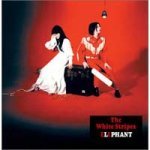
White Stripes Elephant
(XL Recordings)
Well, this is the one we've been waiting for. For the fans, there's been Internet gossip, the spat with Ryan Adams, and $200 e-bay auctions for advance copies. The press have got carried away with this too; NME reviewed the album about a month early - frustrating for those of us outside the industry - and even the normally sedate Guardian has gone wild for the siblings White. It's understandable, though. After two albums that barely registered a blip outside of their own Detroit underground scene, the support of John Peel and a series of sell-out gigs in London, their last album, White Blood Cells was the revolutionary sensation of 2001, clearly taking the Whites by surprise. Alongside the media frenzy - a great opportunity to watch the ignorant likes of Sun 'journalist' Dominic Moron making turds out of themselves - WBC sold 1 million copies, unheard of for the stripped down triptych of guitars, drums and vocals, and turned Jack and Meg White into unwilling superstars.
In a reassuring way, Elephant is a familiar album. It follows a similar blueprint to its predecessors, the astounding mixture of tortured child singing, home-release drums, delta-blues, Howling Wolf guitars, and rhythms drawn from Grand Ol' Opry waltzes. The lyrics are similarly psychotic-sweet, backed - this time with an outing as lead (more later) - by the follow-me-up-the-garden-path voice of pale-faced belle Meg. Musically, there's not really much innovation - there's very little possible given Jack's puritan ethics; perhaps the sound is rawer than WBC, maybe closer to De Stijl. In fact, there's less production than WBC, something that may be almost impossible to imagine on a modern album.
Might one criticise the 'Stripes for such musical straight-jacketing? In a way it would be like attacking a lack of musical vision in the later AC-DC or James Brown. The White Stripes have created their own micro-genre, based on the rich history of American folk music and an encyclopaedic knowledge of the blues, all with their own perverse twist. It's a sound that can't be imitated, because it is The White Stripes. There are no instruments from after 1969, no computers, only the Mondrian-like insistence on stripping music to the most basic combination of three elements. The distinctive recipe is there loud and clear on the magnificent opener Seven Nation Army, a rock anthem of astonishing menace and dedication. There's a unity, unpredictability and jaggedness that constantly defies prejudgment, despite the rigid formula. The delta blues is the key influence, including the sounds of artists like Charlie Patton and Son House, forgotten by many of the myopic rockers of today.
Maybe the difference is the greater darkness of this album. It's dedicated mysteriously to 'the sweetheart'. If WBC was an album about childhood and trying not to grow up, Elephant is about maturing into and through an adolescent sexuality that is shocked, innocent and twisted in equal measure. It's an album that believes in love, but maybe also believes in murder, a bit like simple anti-hero of Slingblade. There are no Hotel Yorba's here, and that's not a bad thing; Yorba is still one of the outstanding rock tracks of the last ten years, but it wouldn't fit on a more emotionally even and musically consistent album, as Elephant undoubtedly is. Tracks like I Want To Be The Boy To Warm Your Mother's Heart mix Faulkner's world with the sexuality of a Tennessee Williams play. It's like an incestuous love triangle with Dolly Parton, Johnny Cash and Dusty Springfield, while their parents play bridge on the porch. It's the sound of swamps, but swamps with knives and dirty, dark secrets and generations-old blood feuds.
The stand out track is Meg's vocal performance, In the Cold, Cold, Night, sparsely backed and softly sung, with a mix of frightening intensity and wide-eyed innocence. It's a short, brilliant song. You've Got Her In Your Pocket is similarly midnight-sweet, a plaintive plea from a scorned lover to his vanquisher, steeped in old-fashioned notions of honour and gentlemanliness. In complete contrast, there's Ball and Biscuit with its brutal extended solo, as exciting as anything since Hendrix realised he had big hands. The album end with Well It's True That We Love One Another, the purest of Country & Western duets, with an alarming and disturbing twist.
Elephant is The White Stripes finest album to date. It's simple, basic, brutal, honest and perverse. No one else is covering the same lyrical territory as Jack White, and no one has such a pure musical vision as he and Meg. Whether there's much more that can be done with the tripartite formula is a question that's yet to be answered. On the evidence of this brilliant, old-fashioned yet formidably modern record, the answer is yes. But it's not really a question that matters. For the time being, and probably for a long time in the future, Elephant is an album that sets the benchmark for rock and roll.
30 March, 2003 - 23:00 — Ben Bollig